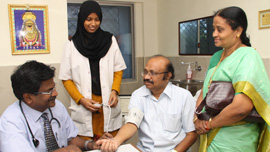Publications:
Development and invitro characterisation of an induced pluripotent stem cell model of ovarian cancer. S. Bindhya. et al, (2021), Int J Biochem Cell Biol, (In Press)
Oncogenes in high grade serous adenocarcinoma of the ovary. Pacharla Manasa. et al, (2020), Genes Cancer, 11, 122-136
The hedgehog pathway regulates cancer stem cells in serous adenocarcinoma of the ovary. Smarakan Sneha. et al, (2020), Cell Oncol, 43, 601-616.
ALDH1A1+ ovarian cancer stem cells co-expressing surface markers CD24, EPHA1 and CD9 form tumours in vivo. Rohit P Nagare. et al, (2020), Exp Cell Res, 392.
Cancer stem cells contribute to angiogenesis and lymphangiogenesis in serous adenocarcinoma of the ovary. Syama Krishnapriya. et al, (2019), Angiogenesis, 22, 441-455.
Induced Pluripotent Stem Cells: A New Strategy to Model Human Cancer. Bindhya S. et al, (2019), Int J Biochem Cell Biol, 107,62-68.
A systematic understanding of signaling by ErbB2 in cancer using phosphoproteomics. C.Sidhanth. et al, (2018), Biochem Cell Biol, 96, 295- 305.
Therapeutic antibodies against cancer stem cells: a promising approach. Smarakan Sneha. et al, (2017), Cancer Immunol Immunother, 66, 1383-1398














